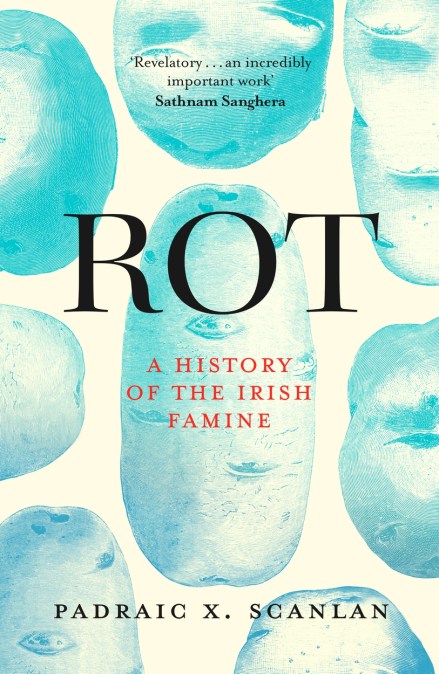In the 1800s, as Britain became the world’s most powerful industrial empire, Ireland starved. The Great Famine fractured long-held assumptions about political economy and ‘civilisation’, threatening disorder in Britain. Ireland was a laboratory for empire, shaping British ideas about colonisation, population, ecology and work.
In Rot, Padraic Scanlan reinterprets the history of this time and the result is a revelatory account of Ireland’s Great Famine. In the first half of the nineteenth century, nowhere in Europe – or the world – did the working poor depend as completely on potatoes as in Ireland. To many British observers, potatoes were evidence of a lack of modernity among the Irish. However, Ireland before the famine more closely resembled capitalism’s future than its past. While poverty before and during the Great Famine was often blamed on Irish backwardness, it did in fact stem from the British Empire’s embrace of modern capitalism.
Uncovering the disaster’s roots in Britain’s deep imperial faith in markets and capitalism, Rot reshapes our understanding of the Famine and its tragic legacy
In Rot, Padraic Scanlan reinterprets the history of this time and the result is a revelatory account of Ireland’s Great Famine. In the first half of the nineteenth century, nowhere in Europe – or the world – did the working poor depend as completely on potatoes as in Ireland. To many British observers, potatoes were evidence of a lack of modernity among the Irish. However, Ireland before the famine more closely resembled capitalism’s future than its past. While poverty before and during the Great Famine was often blamed on Irish backwardness, it did in fact stem from the British Empire’s embrace of modern capitalism.
Uncovering the disaster’s roots in Britain’s deep imperial faith in markets and capitalism, Rot reshapes our understanding of the Famine and its tragic legacy
Newsletter Signup
By clicking ‘Sign Up,’ I acknowledge that I have read and agree to Hachette Book Group’s Privacy Policy and Terms of Use
Reviews
Slave Empire is lucid, elegant and forensic. It deals with appalling horrors in cool and convincing prose.
Praise for the author's Slave Empire: Scanlan shows that the liberal empire of the nineteenth century was the outcome of the long encounter of antislavery and economic expansion founded on enslaved or unfree labour. Antislavery was itself the excuse for empire.
Praise for the author's Slave Empire: Path-breaking . . . a major rewriting of history.
Praise for the author's Slave Empire: A sweeping and devastating history of how slavery made modern Britain, and destroyed so much else . . . a shattering rebuke to the amnesia and myopia which still structure British history.
Praise for the author's Slave Empire: Engrossing and powerful . . . rich and thought-provoking.
Praise for the author's Slave Empire: Powerful, often devastating, always compelling.
Praise for the author's Slave Empire: This accessible synthesis of recent scholarship comes at the right time to help shape current debates about Britain and slavery.
Praise for the author's Slave Empire: Fresh and fascinating, a stunning narrative that shows how an empire built on slavery became an empire sustained and expanded by antislavery . . . deftly combines rich storytelling with vivid details and deep scholarship.
